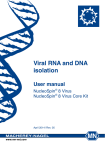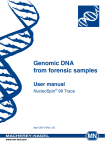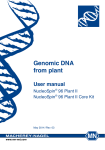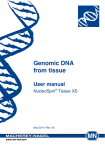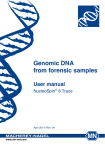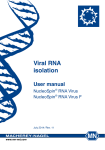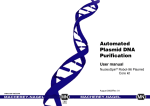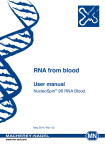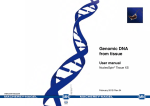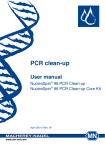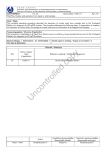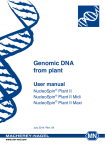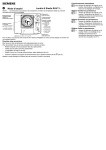Download Viral RNA and DNA isolation - MACHEREY
Transcript
Viral RNA and DNA isolation User manual NucleoSpin® 96 Virus NucleoSpin® 96 Virus Core Kit April 2014 / Rev. 05 Viral RNA and DNA isolation Table of contents 1 2 Components 4 1.1 Kit contents 4 1.2 Reagents and to be supplied by user 5 Product description 6 2.1 The basic principle 6 2.2 Kit specifications 7 2.3 Required hardware 8 2.4 Recommended accessories for use of the NucleoSpin® 96 Virus Core Kit 8 2.5 Automated processing on robotic platforms 10 2.6 Sample material 10 2.7 Carrier RNA 11 2.8 Elution procedures 12 3 Storage conditions and preparation of working solutions 13 4 Safety instructions 15 Protocols 17 5 5.1 NucleoSpin® 96 Virus – centrifuge processing 17 5.2 NucleoSpin 96 Virus (Core Kit) – vacuum processing 22 Appendix 28 ® 6 6.1 Troubleshooting 28 6.2 Ordering information 29 6.3 Product use restriction / warranty 30 MACHEREY-NAGEL – 04 / 2014, Rev. 05 3 Viral RNA and DNA isolation 1 Components 1.1 Kit contents NucleoSpin® 96 Virus 2 x 96 preps 4 x 96 preps REF 740691.2 740691.4 Lysis Buffer RAV11 3 x 40 mL 6 x 40 mL Wash Buffer RAW 2 x 75 mL 300 mL Wash Buffer RAV3 (Concentrate)1 100 mL 2 x 100 mL RNase-free H2O 125 mL 125 mL Elution Buffer RE2 125 mL 125 mL Carrier RNA (lyophilized)1 3 x 1 mg 6 x 1 mg Proteinase K (lyophilized)1 2 x 50 mg 3 x 75 mg 8 mL 15 mL NucleoSpin® Virus Binding Plates (blue rings) 2 4 Round-well Block with Cap Strips 2 4 Cap Strips 24 48 MN Square-well Blocks 6 12 Rack of Tube Strips3 2 4 Self-adhering PE Foil 10 20 User manual 1 1 Proteinase Buffer PB 1 2 3 For preparation of working solutions and storage conditions see section 3. Elution Buffer RE: 5 mM Tris/HCl, pH 8.5 Set of 1 rack, 12 strips with 8 tubes each, Cap Strips included 4 MACHEREY-NAGEL – 04/ 2014, Rev. 05 Viral RNA and DNA isolation 1.1 Kit contents continued NucleoSpin® 96 Virus Core Kit 4 x 96 preps REF 740452.4 Lysis Buffer RAV1 6 x 40 mL Wash Buffer RAW 300 mL 1 Wash Buffer RAV3 (Concentrate)1 2 x 100 mL RNase-free H2O 125 mL Elution Buffer RE2 125 mL Carrier RNA (lyophilized)1 6 x 1 mg NucleoSpin® Virus Binding Plates (blue rings) 4 User manual 1 1.2 Reagents and to be supplied by user Reagents • 96–100% ethanol (for preparation of working solutions; see section 3) For more detailed information regarding special hardware required for centrifuge or vacuum processing, please see section 2.3. For recommended accessories for use of the flexible NucleoSpin® 96 Virus Core Kit (reduced kit composition; REF 740452.4), please see section 2.4. 1 2 For preparation of working solutions and storage conditions see section 3. Elution Buffer RE: 5 mM Tris/HCl, pH 8.5 MACHEREY-NAGEL – 04 / 2014, Rev. 05 5 Viral RNA and DNA isolation 2 Product description 2.1 The basic principle The NucleoSpin® 96 Virus kit is designed for the simultaneous purification of viral RNA and DNA. The kit combines the selectivity of well established silica membrane binding of nucleic acids with high-throughput 96-well format. With the NucleoSpin® 96 Virus method, RNA viruses are quickly and efficiently lysed by Lysis Buffer RAV1 which is a highly concentrated GITC solution. Compared to RNA viruses, DNA viruses (e.g., HBV) are usually more difficult to isolate and require a digestion of samples with Proteinase K which is provided in the kit. Lysis buffer and ethanol create appropriate conditions for binding of nucleic acids to the silica membrane of the NucleoSpin® Virus Binding Plate. Carrier RNA included in Lysis Buffer RAV1 improves binding and recovery of low concentrated viral RNA / DNA. Contaminations (potential PCR inhibitors) like salts, metabolites, and soluble macromolecular cellular components are removed in washing steps with ethanolic Wash Buffer RAW and Buffer RAV3. The purified viral nucleic acids can be eluted in low salt buffer or water and are ready-to-use in subsequent downstream applications like RT-PCR or PCR. Choice of NucleoSpin® Virus kits The NucleoSpin® 96 Virus kit allows the purification of up to 96 samples. The kit is primarily designed for centrifugation use; vacuum use is also possible. Use of the kit on liquid handling instruments (mainly vacuum) allows more variation and higher flexibility in the consumables used for lysis, washing, and elution. MACHEREY-NAGEL takes this into account by introducing the NucleoSpin® 96 Virus Core Kit, which is primarily recommended for manual or automated vacuum use. Core kits contain the core items like binding plates and buffers but no accessories like plastics or enzymes. The core kits together with a large variety of suitable disposables ensure the highest degree of flexibility for the user. For lower or medium throughput the NucleoSpin® 96 Virus kit is also available in 8-well strip format (see ordering information). Table 1: Kit selection guide Application Kit recommendation Manual use, centrifuge Low-/medium throughput High throughput NucleoSpin® 8 Virus* NucleoSpin® 96 Virus Manual use, vacuum Low-/medium throughput NucleoSpin® 8 Virus* NucleoSpin® 8 Virus Core Kit High throughput NucleoSpin® 96 Virus NucleoSpin® 96 Virus Core Kit Low-/medium throughput High throughput NucleoSpin® 8 Virus Core Kit* NucleoSpin® 96 Virus Core Kit Automated use, vacuum or centrifuge * Please refer to the NucleoSpin® 8 Virus user manual. See section 6.2 for ordering information. 6 MACHEREY-NAGEL – 04/ 2014, Rev. 05 Viral RNA and DNA isolation 2.2 Kit specifications • NucleoSpin® 96 Virus allows the parallel purification of viral DNA and RNA from 100–150 μL plasma, serum, or other cell-free biological fluids. Samples can either be fresh or frozen. Furthermore, particle-free supernatants of tissue suspensions, supernatants of stool samples, swab material, or diluted blood samples may also be processed. For detailed information on sample pretreatment please refer to section 2.6. • The purified nucleic acids are suitable for applications like real-time PCR / RT-PCR, PCR, or any kind of enzymatic manipulation. The detection limit for certain viruses depends on individual procedures, for example in-house nested (RT-) PCR. Use of internal extraction control samples as well as positive and negative amplification controls in order to monitor the purification, amplification and detection processes is highly recommended. • NucleoSpin® 96 Virus Core Kit is primarily designed for vacuum use (for manual use or automated use on robotic platforms). Processing under vacuum allows easy automation on common liquid handling instruments. For more information about the automation process and the availability of ready-to-run scripts for certain platforms please refer to section 2.5 and contact your local distributor or MN directly. Table 2: Kit specifications at a glance Parameter NucleoSpin® 96 Virus (Core Kit) Technology Silica-membrane technology Format Processing 96-well plates Manual or automated, vacuum or entrifugation Sample volume 100–150 μL* Typical recovery > 90 % Analysis limit Elution volume 30–60 cp/mL 70–100 μL Preparation time 60 min/plate Binding capacity 40 μg * Lysis must be done in MN Square-well Blocks if sample size is 150 μL. Additional MN Square-well Blocks may be necessary (see ordering information). MACHEREY-NAGEL – 04 / 2014, Rev. 05 7 Viral RNA and DNA isolation 2.3 Required hardware Centrifugation For centrifugation a microtiterplate centrifuge which is able to accommodate the NucleoSpin® Virus Binding Plate stacked on a Round- or Square-well Block and reaches accelerations of 5,600–6,000 x g is required (bucket height: 85 mm). Vacuum processing Although the NucleoSpin® 96 Virus kit is designed primarily for processing under centrifugation, processing under vacuum is also possible. The dead volume for the elution step is higher in comparison to centrifuge based elution. In order to achieve highly concentrated eluates and to avoid contamination, it is recommended performing the elution step by centrifugation. Consumables for vacuum processing differ from the consumables required for centrifugation. Therefore, for vacuum processing, we recommend using the NucleoSpin® 96 Virus Core Kit. For manual processing under vacuum a NucleoVac 96 Vacuum Manifold (see ordering information) is required for NucleoSpin® 96 Virus Core Kit. 2.4 Recommended accessories for use of the NucleoSpin® 96 Virus Core Kit The NucleoSpin® 96 Virus Core Kit provides the buffers, Carrier RNA, and NucleoSpin® Virus Binding Plates. Accessory plates (e.g., lysis plates, elution plates, and Proteinase K) are not provided with the core kits. The user can individually select additional consumables from a variety of suitable accessory plates according to his requirements for highest flexibility. For use of the NucleoSpin® 96 Virus Core Kit, follow the standard protocol (see section 5). Recommended accessories for use of the NucleoSpin® 96 Virus Core Kits are available from MACHEREY-NAGEL (see ordering information): Protocol step Suitable consumables, not supplied with the core kits Remarks 1. Lyse samples Round-well Block with 12 Cap Strips Round-well Blocks and Tube Strips can be closed with Cap Strips. or Rack of Tube Strips with 12 Cap Strips 8 MACHEREY-NAGEL – 04/ 2014, Rev. 05 Viral RNA and DNA isolation Protocol step Suitable consumables, not supplied with the core kits or MN Square-well Block Square-well Block Remarks Square-well Blocks cannot be closed with Cap Strips. Closing with a Self-adhering PE Foil is not recommended (no tight sealing when mixing). Repeated pipetting up and down is recommended for mixing samples with Buffer RAV1. Proteinase K For certain samples and for viral DNA isolation use of Proteinase K is required. 2. Adjust binding conditions Cap Strips When using Round-well Block or Tube Strips for lysis, new Cap Strips are required for closure of wells. 3 Transfer samples MN Square-well Block Can be used for waste collection if required. 4 Bind nucleic acids to the membrane MN Wash Plate MN Wash Plate minimizes the risk of cross contamination. (used for vacuum processing only) 7. Wash silica membrane* MN Square-well Block Can be used for waste collection if required. 8. Elute DNA Rack of Tubes Strips with Cap Strips Round-well Blocks and Tube Strips can be closed with Cap Strips or Round-well Block * Use of MN Square well Block is optional. For waste collection the waste tray of the NucleoVac Vacuum Manifold can be used. MACHEREY-NAGEL – 04 / 2014, Rev. 05 9 Viral RNA and DNA isolation 2.5 Automated processing on robotic platforms For automated use we recommend using the NucleoSpin® 96 Virus Core Kit which can be automated on many common laboratory workstations. For a protocol which can be used as a guideline to create robotic script see section 5.2. For the availability of scripts and general considerations about adapting NucleoSpin® 96 Virus Core Kit on a certain workstation please contact MACHEREY-NAGEL. For vacuum processing the use of the disposable MN Wash Plate inside the vacuum manifold is recommended. Use of the MN Wash Plate reduces the risk of crosscontamination caused by spraying of solutions during vacuum filtration steps. Visit MN at www.mn-net.com or contact your local MACHEREY-NAGEL distributor for technical support regarding hardware, software, setup instructions, and selection of the protocol. 2.6 Sample material Liquid samples Biological fluids or semi-fluid samples can be processed (e.g., serum, urine, or bronchoalveolar lavage). For successful nucleic acid purification it is important to obtain a homogeneous, clear, and non-viscous sample before loading onto the NucleoSpin® Virus Binding Plate. Therefore, check all samples (especially old or frozen ones) for presence of precipitates. Precipitates can be removed after addition of Lysis Buffer RAV1 and lysis incubation by centrifugation. Avoid clearing samples by centrifugation / filtration before the Buffer RAV1-lysis step, because viruses of interest may be associated with particles or aggregates. Incubation with Buffer RAV1 can be prolonged in order to dissolve and digest residual cell structures, precipitates and virus particles. RNA, however, is sensitive and prolonged incubation may cause decreased yields. Solid samples (tissue samples, stool samples) Prepare a 10 % (w / v) suspension of tissue in buffer (e.g., PBS) using commercial homogenization tools (rotor-stator or bead-based homogenization tools, etc.). Centrifuge the suspension in order to remove particles. Use the clear particle-free supernatant for further processing. Swab material Incubate swab in a suitable buffer (e.g., PBS) or cell-culture medium for 30 min. Proceed with particle-free buffer or medium. Blood samples Processing of blood samples is possible if using blood diluted with PBS buffer. Using undiluted blood may cause clogging of the silica membrane of the NucleoSpin® Virus Binding Plate. The amount of PBS buffer added to blood samples has to be optimized 10 MACHEREY-NAGEL – 04/ 2014, Rev. 05 Viral RNA and DNA isolation for the individual organism. As a rule of thumb we recommend to start with 50 μL blood diluted with 50 μL PBS buffer. Sample volume The NucleoSpin® 96 Virus and NucleoSpin® 96 Virus Core Kits are specified for a sample volume of 100 μL. If necessary, the sample volume can be increased to 150 μL. For sample volumes of 150 μL the volumes of Lysis Buffer RAV1 and ethanol have to be increased to 600 μL each. Depending on the size of pipetting tips, the total lysate volume of 1300 μL may be loaded in two steps onto the NucleoSpin® Virus Binding Plate. The buffers supplied with the kit are sufficient for processing a sample volume of 150 μL*. Proteinase K treatment Addition of Proteinase K solution is necessary for the isolation of viral DNA or simultaneous viral RNA / DNA isolation. For isolation of viral RNA Proteinase K treatment is usually not required. Proteinase K treatment is recommended for viral RNA isolation when viscous samples have to be processed (e.g., sputum samples). Sample lysis For isolation of viral RNA in general a lysis of samples in Buffer RAV1 for 10 min at room temperature (18–25 °C) will be sufficient. For isolation of viral RNA from viscous samples, for example sputum or supernatants of tissue suspensions or stool samples, a lysis at 70 °C may be required. For simultaneous isolation of viral RNA and DNA, incubation time (e.g., 5–15 min), and temperature (e.g., RT, 56 °C, or 70 °C) should be optimized and adjusted to the sample material used. 2.7 Carrier RNA The NucleoSpin® 96 Virus kits include Carrier RNA that enhances binding of viral nucleic acids to the silica membrane and reduces the risk of viral RNA degradation. Please note that eluates of the NucleoSpin® 96 Virus kit contain both viral nucleic acids and Carrier RNA with amounts of Carrier RNA that may exceed the amount of viral nucleic acids. Therefore it is not possible to quantify the nucleic acids isolated with the kit by photometric or fluorometric methods when using the carrier. Thus, other methods for quantification such as specific quantitative PCR or RT-PCR systems are recommended. Furthermore, Carrier RNA may inhibit PCR reactions. The amount of added Carrier RNA may thus be carefully optimized depending on the individual PCR system used. * Lysis must be done in MN Square-well Blocks if sample size is 150 μL. Additional MN Square-well Blocks may be necessary (see ordering information). MACHEREY-NAGEL – 04 / 2014, Rev. 05 11 Viral RNA and DNA isolation 2.8 Elution procedures Recovery of viral RNA or DNA from the membrane depends on the elution volume. Elution volumes of 75–200 μL are possible, with an optimum of 100–125 μL dispensed volume. The dead volume of the membrane is approx. 45 μL and the recovered elution buffer can thus easily be estimated. Highly concentrated eluates: When using a minimal elution volume (75–100 μL), about 70–80 % of bound nucleic acids can be eluted, resulting in highly concentrated RNA /DNA. Alternatively, elution can be done in two steps with, for example 75 μL each, resulting in a higher elution efficiency but with a lower concentrated eluate. Preheated elution buffer (70 °C): Use preheated elution buffer to increase overall yield. Optionally, following addition of preheated elution buffer incubate the NucleoSpin® Virus Binding Plate for 3 min at 60–70 °C before elution. 12 MACHEREY-NAGEL – 04/ 2014, Rev. 05 Viral RNA and DNA isolation 3 Storage conditions and preparation of working solutions Attention: Buffers RAV1 and RAW contain guanidinium salts! Wear gloves and goggles! CAUTION: Buffer RAV1 contains guanidinium thiocyanate and Buffer RW contains guanidine hydrochloride which can form highly reactive compounds when combined with bleach (sodium hypochlorite). DO NOT add bleach or acidic solutions directly to the sample-preparation waste. Before starting any NucleoSpin® 96 Virus (Core Kit) protocol, prepare the following: • Wash Buffer RAV3: Add indicated volume of 96–100 % ethanol to the Wash Buffer RAV3 Concentrate. Mark the label of the bottle to indicate that ethanol was added. • Before first use of the kit, add the indicated volume of Proteinase Buffer PB to dissolve lyophilized Proteinase K. Proteinase K solution is stable at -20 °C for 6 months. Dividing the solution into aliquots is recommended. • Before use, add 1 mL Lysis Buffer RAV1 to the Carrier RNA tube. Dissolve the RNA and transfer it back to the Buffer RAV1 bottle. Mark the label of the bottle to indicate that Carrier RNA was added. Due to the production procedure and the small amount of Carrier RNA contained in the vial, the Carrier RNA may hardly be visible in the vial. Carrier RNA has a limited shelf-life in Buffer RAV1. For this reason the NucleoSpin® 96 Virus (Core Kit) kit contains several vials of lyophilized Carrier RNA which should be used successively as required. Storage of Carrier RNA in Buffer RAV1 Buffer RAV1 with Carrier RNA can be stored at room temperature for 1–2 weeks. Storage at room temperature prevents salt precipitation and avoids preheating of the buffer solution! For storage for up to 4 weeks storage of Buffer RAV1 with added Carrier RNA at 4 °C is recommended. For long time storage Buffer RAV1 with added Carrier RNA can be stored in aliquots at -20 °C. Storage at 4 °C or below may cause salt precipitation. Therefore, the mixture must be preheated at 40–60 °C for a maximum of 5 min in order to dissolve precipitated salts. Attention: Frequent heating, temperatures > 80 °C, and extended heat incubation will lead to the degradation of the Carrier RNA and to reduced recovery of viral RNA and eventually false negative RT-PCR results, in particular if low-titer samples are used. Do not heat-up Buffer RAV1 containing Carrier RNA more than 4 times! MACHEREY-NAGEL – 04 / 2014, Rev. 05 13 Viral RNA and DNA isolation NucleoSpin® 96 Virus 2 x 96 preps 4 x 96 preps 740691.2 740691.4 100 mL Add 400 mL ethanol 2 x 100 mL Add 400 mL ethanol to each bottle Proteinase K (lyophilized) 2 x 50 mg Add 2.5 mL Proteinase Buffer to each vial 3 x 75 mg Add 3.5 mL Proteinase Buffer to each vial Carrier RNA (lyophilized) 3 x 1 mg Transfer each vial to one bottle of 40 mL Buffer RAV1 6 x 1 mg Transfer each vial to one bottle of 40 mL Buffer RAV1 REF Wash Buffer RAV3 (Concentrate) NucleoSpin® 96 Virus Core Kit 4 x 96 preps REF Wash Buffer RAV3 (Concentrate) Carrier RNA (lyophilized) 14 740452.4 2 x 100 mL Add 400 mL ethanol to each bottle 6 x 1 mg Transfer each vial to one bottle of 40 mL Buffer RAV1 MACHEREY-NAGEL – 04/ 2014, Rev. 05 Viral RNA and DNA isolation 4 Safety instructions The following components of the NucleoSpin® 96 Virus and NucleoSpin® 96 Virus Core kits contain hazardous contents. Wear gloves and goggles and follow the safety instructions given in this section. GHS classification Only harmful features need not be labeled with H and P phrases up to 125 mL or 125 g. Mindergefährliche Eigenschaften müssen bis 125 mL oder 125 g nicht mit H- und P-Sätzen gekennzeichnet werden. Component Hazard contents GHS symbol Hazard Precaution phrases phrases Inhalt Gefahrstoff GHS Symbol H-Sätze P-Sätze RAV1 Guanidinium thiocyanate 30–60 % Warning Guanidiniumthiocyanat 30–60 % Achtung 302, 412, EUH031 260, 273, 301+312, 330 Guanidinium hydrochloride 24–36 % + isopropanol 35–55 % Warning 226, 302, Guanidiniumhydrochlorid 24–36 %+ Isopropanol 35–55 % Achtung 210, 233, 301+312, 330, 403+235 Proteinase K, lyophilized Danger 315, 319, 334, 335 261, 280, 302+352, 304+340, 305+351+338, 312, 332+313, 337+313, 342+311, 403+233 RAW Proteinase K Proteinase K, lyophilisiert Gefahr Hazard phrases H 226 Flammable liquid and vapour. H 302 Harmful if swallowed. H 315 Causes skin irritation. H 319 Causes serious eye irritation. H 334 May cause allergy or asthma symptoms or breathing difficulties if inhaled. H 335 May cause respiratory irritation. Flüssigjkeit und Dampf entzündbar. Gesundheitsschädich bei Verschlucken. Verursacht Hautreizungen. Verursacht schwere Augenreizung. Kann bei Einatmen Allergie, asthmaartige Symptome oder Atembeschwerden verursachen. Kann die Atemwege reizen. MACHEREY-NAGEL – 04 / 2014, Rev. 05 15 Viral RNA and DNA isolation H 412 Harmful to aquatic life with long lasting effects. EUH031 Contact with acids liberates toxic gas. Schädlich für Wasserorganismen, mit langfristiger Wirkung. Entwickelt bei Berührung mit Säure giftige Gase. Precaution phrases P 210 Keep away from heat, hot surfaces, sparks, open flames and other ignition sources. No smoking. Von Hitze, heißen Oberflächen, Funken, offenen Flammen sowie anderen Zündquellenarten fernhalten. Nicht rauchen. P 233 Keep container tightly closed. P 260 Do not breathe vapours. P 261 Avoid breathing dust. P 273 Avoid release to the environment. P 280 Wear protective gloves / eye protection. P 301+312 IF SWALLOWED: Call a POISON CENTER/ doctor/…/if you feel unwell. P 302+352 IF ON SKIN: Wash with plenty of water/… P 304+340 IF INHALED: Remove victim to fresh air and keep at rest in a position comfortable for breathing. Behälter dicht verschlossen halten. Dampf nicht einatmen. Einatmen von Staub vermeiden. Freisetzung in die Umwelt vermeiden. Schutzhandschuhe / Augenschutz tragen. BEI VERSCHLUCKEN: Bei Unwohlsein GIFTINFORMATIONSZENTRUM / Arzt /… anrufen. BEI KONTAKT MIT DER HAUT: Mit viel Wasser/… waschen. BEI EINATMEN: An die frische Luft bringen und in einer Position ruhigstellen, die das Atmen erleichtert. P 305+351+338 IF IN EYES: Rinse cautiously with water for several minutes. Remove contact lenses, if present and easy to do. Continue rinsing. Bei Kontakt mit den Augen: Einige Minuten lang behutsam mit Wasser spülen. Vorhandene Kontaktlinsen nach Möglichkeit entfernen. Weiter spülen. P 312 Call a POISON CENTER/ doctor/…/if you feel unwell. P 330 Rinse mouth. P 332+313 IF skin irritation occurs: Get medical advice / attention. P 337+313 If eye irritation persists: Get medical advice / attention. P 342+311 If experiencing respiratory symptoms: Call a POISON CENTER/ doctor/… P 403+233 Store in a well ventilated place. Keep container tightly closed. P 403+235 Store in a well ventilated place. Keep cool. Bei Unwohlsein GIFTINFORMATIONSZENTRUM / Arzt /… anrufen. Mund ausspülen. Bei Hautreizung: Ärztlichen Rat einholen / ärztliche Hilfe hinzuziehen. Bei anhaltender Augenreizung: Ärztlichen Rat einholen / ärztliche Hilfe hinzuziehen. Bei Symptomen der Atemwege: GIFTINFORMATIONSZENTRUM /Arzt/… anrufen. Behälter dicht verschlossen an einem gut belüfteten Ort aufbewahren. Kühl an einem gut belüfteten Ort aufbewahren. For further information please see Material Safety Data Sheets (www.mn-net.com). Weiterführende Informationen finden Sie in den Sicherheitsdatenblättern (www.mn-net.com). 16 MACHEREY-NAGEL – 04/ 2014, Rev. 05 NucleoSpin® 96 Virus – centrifuge processing 5 Protocols 5.1 NucleoSpin® 96 Virus – centrifuge processing • For hardware requirements, refer to section 2.3. • For use of the NucleoSpin® 96 Virus Core Kit (REF 740452.4), refer to section 2.4 regarding recommended accessories. • For detailed information on each step see page 21. Before starting the preparation: • • • Check if Buffer RAV1, Buffer RAV3, and Proteinase K were prepared according to section 3. Set incubator or oven to 25–70 °C. Preheat Elution Buffer RE or water to 70 °C. Protocol-at-a-glance 1 Lyse samples 100 μL sample 400 μL Buffer RAV1 (20 μL Proteinase K) Mix 25–70 °C, 10 min 2 Adjust binding conditions 400 μL ethanol (96–100 %) Mix 3 Transfer samples to NucleoSpin® Virus Binding Plate 4 Bind viral RNA and DNA to silica membrane of the NucleoSpin® Virus Binding Plate 5,600–6,000 x g, 2 min MACHEREY-NAGEL – 04 / 2014, Rev. 05 17 NucleoSpin® 96 Virus – centrifuge processing 5 Wash silica membrane 500 μL RAW 5,600–6,000 x g, 2 min 700 μL RAV3 5,600–6,000 x g, 2 min 700 μL RAV3 5,600 x g 15 min 6 Elute viral RNA and DNA 100 μL RE (70 °C) 5,600–6,000 x g, 2 min Optional: Repeat elution step once 18 MACHEREY-NAGEL – 04/ 2014, Rev. 05 NucleoSpin® 96 Virus – centrifuge processing Detailed protocol This standard protocol is recommended for purification of viral RNA from, for example HCV or HIV. DNA viruses such as CMV can also be isolated but lysis including Proteinase K digestion is recommended. Place the NucleoSpin® Virus Binding Plate on an MN Square-well Block. The use of a second plate placed on an MN Square-well Block avoids the need to balance the centrifuge. • • For hardware requirements, refer to section 2.3. For use of the NucleoSpin® 96 Virus Core Kit (REF 740452.4), refer to section 2.4 regarding recommended accessories. Before starting the preparation: • • • 1 Check if Buffer RAV1, Buffer RAV3, and Proteinase K were prepared according to section 3. Set incubator or oven to 25–70 °C. Preheat Elution Buffer RE or water to 70 °C. Lyse samples Pipette 400 μL Buffer RAV1 into the wells of a Rack of Tube Strips or Roundwell Block according to the number of samples. Dispense solution to the bottom of the wells. If 150 μL sample are to be prepared*, pipette 600 μL Buffer RAV1 into the wells. We recommend using an electronic 8-channel pipetting device with extra long tips capable of holding more than 650 μL. Add 100 μL sample to each Buffer RAV1-filled well. Take care to dispense the sample directly into Buffer RAV1. Pipette mixture up and down several times. Do not moisten the rims. Close Tube Strips or Round-well Block with Cap Strips. Incubate mixture for 10 min at room temperature (18–25 °C). Optional: Add 20 μL Proteinase K to each sample pre-mixed with Buffer RAV1. Close the lysis vessels with Cap Strips and incubate for 5–10 min at 56–70°C. Addition of Proteinase K is required for viral DNA extraction and may be useful for viral RNA extraction from some sample types. For details on incubation time and temperature see section 2.6. Spin down droplets (30 s; 1,500 x g) before opening the Cap Strips. * Lysis must be done in MN Square-well Blocks if sample size is 150 μL. Additional MN Square-well Blocks may be necessary (see ordering information). MACHEREY-NAGEL – 04 / 2014, Rev. 05 19 NucleoSpin® 96 Virus – centrifuge processing 2 Adjust viral nucleic acid binding conditions Remove Cap Strips and add 400 μL ethanol (96–100 %) to each lysate. Take care not to moisten the rims of the individual wells while dispensing. Close the individual wells with new Cap Strips (supplied). Invert 10 times and mix by shaking for 15 s. Spin down droplets (30 s; 1,500 x g) from the Cap Strips. If 150 μL sample has been prepared, add 600 μL ethanol (96–100 %) to each lysate. 3 Transfer samples to binding plates Remove the first Cap Strip and transfer all of each sample into the wells of a NucleoSpin® Virus Binding Plate positioned on top of the MN Square-well Block. Do not moisten the rims of the individual wells while dispensing samples (moistened rims may cause cross-contamination during centrifugation). Seal NucleoSpin® Virus Binding Plates with Self-adhering PE Foil. 4 Bind viral nucleic acids to silica membrane Place the MN Square-well Blocks with Binding Plate onto the centrifuge carrier and insert it into the rotor buckets. Centrifuge at 5,600–6,000 x g for 2 min. Typically, samples will pass through the columns within ≤ 1 min. Optional: If 150 μL sample has been prepared, load it in successive steps onto the NucleoSpin® Virus Binding Plate as described in step 3. In this case use a new MN Square-well Block for the washing steps as the maximum volume of the MN Squarewell Block may be exceeded (additional MN Square-well Blocks are not included in the kit, see ordering information). 5 Wash silica membrane 1st wash Remove Self-adhering PE Foil and add 500 μL Buffer RAW to each well of the NucleoSpin® Virus Binding Plate. Seal the NucleoSpin® Virus Binding Plates with new Self-adhering PE Foil. Centrifuge at 5,600–6,000 x g for 1–2 min. Remove Self-adhering PE Foil and place NucleoSpin® Virus Binding Plate onto a new MN Square-well Block. 2nd wash Add 700 μL Buffer RAV3 to each well of the NucleoSpin® Virus Binding Plate. Seal with new Self-adhering PE Foil. Centrifuge at 5,600–6,000 x g for 1–2 min. 20 MACHEREY-NAGEL – 04/ 2014, Rev. 05 NucleoSpin® 96 Virus – centrifuge processing 3rd wash Repeat second wash step once. Prolong centrifugation to 15 min in order to remove ethanol from residual Wash Buffer RAV3. Alternatively, remove the adhesive foil and place the NucleoSpin® Virus Binding Plate into an incubator for 20 min at 37 °C to evaporate residual ethanol. Removal of ethanol by evaporation at 37 °C is more effective than additional, prolonged centrifugation (15 min, 6,000 x g). 6 Elute viral RNA and DNA Place the NucleoSpin® Virus Binding Plate onto the Rack of Tube Strips. Dispense 75–100 μL RNase-free water or Buffer RE (preheated to 70 °C) to each well of the NucleoSpin® Virus Binding Plate. Pipette the buffer directly onto the membrane. Incubate at room temperature for 1 min. Seal with a new Self-adhesive PE Foil. Centrifuge at 5,600–6,000 x g for 2–3 min. Tube Strips containing eluted RNA / DNA can be conveniently closed with Cap Strips for storage. Yields will be 10–15 % higher when eluting in 100–200 μL water. The concentration of nucleic acids in the complete eluate, however, will be lower. For RT-PCR /PCR a more concentrated eluate is favorable. If only viral DNA is processed, elution should be done with Elution Buffer RE optimized for elution and storage of DNA. MACHEREY-NAGEL – 04 / 2014, Rev. 05 21 NucleoSpin® 96 Virus – vacuum processing 5.2 NucleoSpin® 96 Virus (Core Kit) – vacuum processing • For hardware requirements refer to section 2.3. • For detailed information regarding the vacuum manifold setup, see page 26. • • For detailed information on each step see page 27. For use of the NucleoSpin® 96 Virus Core Kit (REF 740452.4), refer to section 2.4 regarding recommended accessories. Before starting the preparation: • • • Check if Buffer RAV1, Buffer RAV3, and Proteinase K were prepared according to section 3. Set incubator or oven to 25–70 °C. Preheat Elution Buffer RE or water to 70 °C. Protocol-at-a-glance 1 Lyse samples 100 μL sample 400 μL Buffer RAV1 (20 μL Proteinase K) Mix 25–70 °C, 10 min 2 Adjust binding conditions 400 μL ethanol (96–100 %) Mix 3 Transfer samples to NucleoSpin® Virus Binding Plate 4 Bind nucleic acid to NucleoSpin® Virus Binding Plate -0.2 bar*, 5 min * Reduction of atmospheric pressure. 22 MACHEREY-NAGEL – 04/ 2014, Rev. 05 NucleoSpin® 96 Virus – vacuum processing 5 Wash and dry silica membrane 500 μL RAW - 0.2 bar* 5 min 700 μL RAV3 -0.2 bar* 2 min 700 μL RAV3 -0.2 bar* 5 min Remove MN Wash Plate -0.6 bar* 15 min 6 Elute viral RNA and DNA 100 μL RE (70 °C) -0.4 bar* 2 min Optional: Repeat elution step once Note: Elution under centrifugation is recommended. * Reduction of atmospheric pressure. MACHEREY-NAGEL – 04 / 2014, Rev. 05 23 NucleoSpin® 96 Virus – vacuum processing Setup of vacuum manifold: Binding / Washing steps Elution step Step 4: Place the NucleoSpin® Binding Plate on top of the manifold lid. Step 4: Place the NucleoSpin® Binding Plate on top of the manifold lid. Step 3: Place the manifold lid on top of the manifold base. Step 3: Place the manifold lid on top of the manifold base. Step 2: Place the MN Wash Plate in the manifold. Step 2: Place the Rack of Tube Strips in the manifold. MICR OT Step 1: Insert spacers ‘MTP/MULTI-96 PLATE‘ and waste container in the manifold base. MICR OT UB UB E RA E RA CK Final setup Step 1: Insert spacers ‘MICROTUBE RACK‘ in the manifold base. Final setup MICR OT MICR OT 24 CK UB UB E RA E RA CK MACHEREY-NAGEL – 04/ 2014, Rev. 05 CK NucleoSpin® 96 Virus – vacuum processing Detailed protocol Whereas the use of a centrifuge for the processing of the NucleoSpin® 96 Virus kit determines most of the consumables to be used (Tube Strips, MN Square-well Blocks, etc.) the vacuum use of the kit allows for more variation and higher flexibility. Especially when processing a large number of samples under vacuum crosscontamination is a major concern due to spraying of liquids or aerosol formation. The use of the MN Wash Plate* prevents the contamination by droplets at the outlets of the individual wells of the NucleoSpin® Binding Plate. This very assistant tool is thus recommended for vacuum processing. When using the NucleoSpin® 96 Virus and the Core Kit under vacuum the NucleoVac 96 Vacuum Manifold is required (see ordering information). Place NucleoSpin® 96 Virus Binding Plate on NucleoVac Vacuum Manifold. If processing less than 96 samples, seal unused wells with a Self-adhering PE Foil in order to ensure proper vacuum during the filtration steps. This standard protocol is recommended for purification of viral RNA from for example HCV or HIV. DNA viruses such as CMV can also be isolated but lysis including Proteinase K digestion is recommended (not included in the core kit). • For hardware requirements refer to section 2.3. • For use of the NucleoSpin® 96 Virus Core Kit (REF 740452.4), refer to section 2.4 regarding recommended accessories. • For detailed information regarding the vacuum manifold setup, see page 26. Before starting the preparation: • • • 1 Check if Buffer RAV1, Buffer RAV3, and Proteinase K were prepared according to section 3. Set incubator or oven to 25–70 °C. Preheat Elution Buffer RE or water to 70 °C. Lyse samples Pipette 400 μL Buffer RAV1 into the wells of a suitable vessel used for lysis. Dispense solution to the bottom of the wells. If 150 μL sample are to be prepared**, pipette 600 μL Buffer RAV1 into the wells. We recommend using an electronic 8-channel pipetting device with extra long tips capable of holding more than 650 μL. Add 100 μL sample to each Buffer RAV1-filled well. Take care to dispense the samples directly into Buffer RAV1. * The MN Wash Plate is not part of the kits. Please order separately (see ordering information). ** Lysis must be done in MN Square-well Blocks if sample size is 150 μL. Additional MN Square-well Blocks may be necessary (see ordering information). MACHEREY-NAGEL – 04 / 2014, Rev. 05 25 NucleoSpin® 96 Virus – vacuum processing Pipette mixture up and down several times. Do not moisten the rims. Close the wells and incubate the mixture for 10 min at room temperature (18–25 °C). Optional: Add 20 μL Proteinase K (20 mg/mL) to each sample pre-mixed with Buffer RAV1. Close the lysis vessels and incubate for 5–10 min at 56–70 °C. Addition of Proteinase K is required for viral DNA extraction and may be useful for viral RNA extraction from some sample types. For details on incubation time and temperature please also refer to section 2.6. Spin briefly (30 s, 1,500 x g) to collect any sample from the cover of the wells if required before opening the lysis vessels. 2 Adjust binding conditions Remove the cover of the wells and add 400 μL ethanol (96–100 %) to each sample. Take care not to moisten the rims of the individual wells while dispensing. Close the wells with a new cover, invert 10 x, and mix by shaking for 15 s. Spin briefly (30 s, 1,500 x g) to collect any sample from the cover of the wells. If 150 μL sample has been prepared, add 600 μL ethanol (96–100 %) to each lysate. 3 Transfer samples to binding plate Place waste tray into vacuum manifold base. Other plates for waste collection can also be used i. Insert spacers labeled ‘MTP/MULTI-96 PLATE’ notched side up and rest the MN Wash Plate on them. Close manifold and place NucleoSpin® Virus Binding Plate on top of the manifold. Transfer samples to the wells of the binding plate and be careful no to moisten the rims of the wells. 4 Bind viral nucleic acids to silica membrane Apply vacuum of -0.2 to -0.4 bar* (reduction of atmospheric pressure) to allow samples to pass through the membrane (2–5 min). Flow-through rate should be about 1–2 drops per second. Adjust vacuum strength accordingly. 5 Wash and dry silica membrane 1st wash Add 500 μL Buffer RAW to each well of the NucleoSpin® Virus Binding Plate. Apply vacuum (- 0.2 to - 0.4 bar1) until all buffer has passed through the wells of the NucleoSpin® Virus Binding Plate (2 – 5 min). Release the vacuum. * Reduction of atmospheric pressure 26 MACHEREY-NAGEL – 04/ 2014, Rev. 05 NucleoSpin® 96 Virus – vacuum processing 2nd wash Add 700 μL Buffer RAV3 to each well of the NucleoSpin® Virus Binding Plate. Apply vacuum (- 0.2 to - 0.4 bar*) until all buffer has passed through the wells of the NucleoSpin® Virus Binding Plate (2–5 min). Release the vacuum. 3rd wash Add 700 μL Buffer RAV3 to each well of the NucleoSpin® Virus Binding Plate. Apply vacuum (- 0.2 to - 0.4 bar1) until all buffer has passed through the wells of the NucleoSpin® Virus Binding Plate (2–5 min). Release the vacuum. Remove MN Wash Plate After the final washing step close the valve, release the vacuum and remove the NucleoSpin® Virus Binding Plate. Put it on a clean paper towel to remove residual EtOH-containing wash buffer. Remove manifold lid, MN Wash Plate, and waste container from the vacuum manifold. Reassemble the vacuum manifold and dry the membrane by applying maximum vacuum (e.g., - 0.6 bar*) for 15 minutes. 6 Elute viral RNA and DNA Place a suitable vessel used for elution on appropriate spacers (e.g., ‘MICROTUBE RACK’) into the manifold base. Close manifold and insert NucleoSpin® Virus Binding Plate onto manifold top. Dispense 100 μL RNasefree water or Buffer RE (preheated to 70 °C) to each well of the plate. Pipette water directly onto the membrane. Incubate at room temperature for 2–3 min and apply vacuum of -0.4 bar* until all of the samples have passed. If only viral DNA is processed, elution should be done with Elution Buffer RE optimized for elution and storage of DNA. Optional: Repeat elution step once (incubation not required). Note: Elution by vacuum may cause cross-contamination due to aerosol formation and spraying of droplets. If possible, it is thus recommended to use centrifugation for the elution step. * Reduction of atmospheric pressure MACHEREY-NAGEL – 04 / 2014, Rev. 05 27 Viral RNA and DNA isolation 6 Appendix 6.1 Troubleshooting Problem Possible cause and suggestions Problems with Carrier RNA Small amounts or no viral nucleic acids in the eluate • Carrier RNA not added. • See remarks concerning storage of Buffer RAV1 with Carrier RNA (section 2.7). Proteinase K digestion • For certain sample types and for viral DNA isolation use of Proteinase K is required for the sample lysis step. Compare protocols with and without Proteinase K digestion. Viral nucleic acids degraded • Samples should be processed immediately. If necessary, add RNase inhibitor to the sample. Create a nuclease-free environment and ensure that no nucleases are present. Use suitable tips and buffer reservoirs. • Check that all buffers have been prepared and stored correctly. If in doubt, use new aliquots of Buffer RAV1 and elution buffer. Reduced sensitivity • Problems with subsequent detection Carrier RNA may interfere with the PCR / RT-PCR system used. Change the volume of eluted viral DNA / RNA added to the PCR / RT-PCR. Use diluted eluates in order to exclude inhibition. Reduce Carrier RNA concentration in Buffer RAV1. Optimal concentration may require some preliminary experiments. Ethanol carry-over • Extend centrifugation times in order to remove Buffer RAV3 completely. PCR inhibition • General problems 28 Add an additional wash step with 96 % ethanol following the last wash with Buffer RAV3. Clogged membrane • Centrifuge sample lysate before the addition of ethanol and subsequent loading onto NucleoSpin® Virus Binding Plate. MACHEREY-NAGEL – 04/ 2014, Rev. 05 Viral RNA and DNA isolation 6.2 Ordering information Product REF Pack of NucleoSpin® 96 Virus 740691.2 740691.4 2 x 96 preps 4 x 96 preps NucleoSpin® 96 Virus Core Kit 740452.4 4 x 96 preps NucleoSpin® 8 Virus 740643 740643.5 12 x 8 preps 60 x 8 preps NucleoSpin® 8 Virus Core Kit 740451.4 48 x 8 preps Proteinase K 740506 100 mg MN Square-well Block 740476 4 Square-well Block 740481 4 Round-well Block with Cap Strips 740475 4 Rack of Tube Strips with Cap Strips 740477 4 Cap Strips 740478 48 MN Wash Plates 740479 4 Self-adhering PE Foil 740676 50 MN Frame 740680 1 Starter Set A 740682 1 (set consists of 1 Round-well Block and12 Cap Strips) (set consists of 1 Rack, 12 Tube Strips with 8 tubes each, and 12 Cap Strips) (for optimized handling of 96-well plates with vacuum manifold on BioRobot® 9600, 9604, and 3000 (Qiagen), MultiPROBE® II (PerkinElmer), Biomek® 2000, and FX (Beckman Coulter) (for use of 8-well strips on the NucleoVac 96 and automation platforms) MACHEREY-NAGEL – 04 / 2014, Rev. 05 29 Viral RNA and DNA isolation Product REF Pack of Starter Set C 740684 1 NucleoVac 96 Vacuum Manifold 740681 1 NucleoVac Vacuum Regulator 740641 1 Support Frame for Column Holder A 740480 1 (for use of 8-well strips under centrifugation) 6.3 Product use restriction / warranty NucleoSpin® 96 Virus (Core Kit) components are intended, developed, designed, and sold FOR RESEARCH PURPOSES ONLY, except, however, any other function of the product being expressly described in original MACHEREY-NAGEL product leaflets. MACHEREY-NAGEL products are intended for GENERAL LABORATORY USE ONLY! MACHEREY-NAGEL products are suited for QUALIFIED PERSONNEL ONLY! MACHEREY-NAGEL products shall in any event only be used wearing adequate PROTECTIVE CLOTHING. For detailed information please refer to the respective Material Safety Data Sheet of the product! MACHEREY-NAGEL products shall exclusively be used in an ADEQUATE TEST ENVIRONMENT. MACHEREY-NAGEL does not assume any responsibility for damages due to improper application of our products in other fields of application. Application on the human body is STRICTLY FORBIDDEN. The respective user is liable for any and all damages resulting from such application. DNA/RNA/PROTEIN purification products of MACHEREY-NAGEL are suitable for IN VITRO-USES ONLY! ONLY MACHEREY-NAGEL products specially labeled as IVD are also suitable for IN VITRO-diagnostic use. Please pay attention to the package of the product. IN VITROdiagnostic products are expressly marked as IVD on the packaging. IF THERE IS NO IVD SIGN, THE PRODUCT SHALL NOT BE SUITABLE FOR IN VITRO-DIAGNOSTIC USE! ALL OTHER PRODUCTS NOT LABELED AS IVD ARE NOT SUITED FOR ANY CLINICAL USE (INCLUDING, BUT NOT LIMITED TO DIAGNOSTIC, THERAPEUTIC AND/OR PROGNOSTIC USE). No claim or representations is intended for its use to identify any specific organism or for clinical use (included, but not limited to diagnostic, prognostic, therapeutic, or blood banking). It is rather in the responsibility of the user or - in any case of resale of the products - in the responsibility of the reseller to inspect and assure the use of the DNA/RNA/protein purification products of MACHEREY-NAGEL for a well-defined and specific application. 30 MACHEREY-NAGEL – 04/ 2014, Rev. 05 Viral RNA and DNA isolation MACHEREY-NAGEL shall only be responsible for the product specifications and the performance range of MN products according to the specifications of in-house quality control, product documentation and marketing material. This MACHEREY-NAGEL product is shipped with documentation stating specifications and other technical information. MACHEREY-NAGEL warrants to meet the stated specifications. MACHEREY-NAGEL´s sole obligation and the customer´s sole remedy is limited to replacement of products free of charge in the event products fail to perform as warranted. Supplementary reference is made to the general business terms and conditions of MACHEREY-NAGEL, which are printed on the price list. Please contact us if you wish to get an extra copy. There is no warranty for and MACHEREY-NAGEL is not liable for damages or defects arising in shipping and handling (transport insurance for customers excluded), or out of accident or improper or abnormal use of this product; defects in products or components not manufactured by MACHEREY-NAGEL, or damages resulting from such non-MACHEREY-NAGEL components or products. MACHEREY-NAGEL makes no other warranty of any kind whatsoever, and SPECIFICALLY DISCLAIMS AND EXCLUDES ALL OTHER WARRANTIES OF ANY KIND OR NATURE WHATSOEVER, DIRECTLY OR INDIRECTLY, EXPRESS OR IMPLIED, INCLUDING, WITHOUT LIMITATION, AS TO THE SUITABILITY, REPRODUCTIVITY, DURABILITY, FITNESS FOR A PARTICULAR PURPOSE OR USE, MERCHANTABILITY, CONDITION, OR ANY OTHER MATTER WITH RESPECT TO MACHEREY-NAGEL PRODUCTS. In no event shall MACHEREY-NAGEL be liable for claims for any other damages, whether direct, indirect, incidental, compensatory, foreseeable, consequential, or special (including but not limited to loss of use, revenue or profit), whether based upon warranty, contract, tort (including negligence) or strict liability arising in connection with the sale or the failure of MACHEREY-NAGEL products to perform in accordance with the stated specifications. This warranty is exclusive and MACHEREY-NAGEL makes no other warranty expressed or implied. The warranty provided herein and the data, specifications and descriptions of this MACHEREY-NAGEL product appearing in MACHEREY-NAGEL published catalogues and product literature are MACHEREY-NAGEL´s sole representations concerning the product and warranty. No other statements or representations, written or oral, by MACHEREY-NAGEL´s employees, agent or representatives, except written statements signed by a duly authorized officer of MACHEREY-NAGEL are authorized; they should not be relied upon by the customer and are not a part of the contract of sale or of this warranty. Product claims are subject to change. Therefore please contact our Technical Service Team for the most up-to-date information on MACHEREY-NAGEL products. You may also contact your local distributor for general scientific information. Applications mentioned in MACHEREY-NAGEL literature are provided for informational purposes only. MACHEREY-NAGEL does not warrant that all applications have been tested in MACHEREY-NAGEL laboratories using MACHEREY-NAGEL products. MACHEREYNAGEL does not warrant the correctness of any of those applications. Last updated: 07 / 2010, Rev. 03 MACHEREY-NAGEL – 04 / 2014, Rev. 05 31 Viral RNA and DNA isolation Please contact: MACHEREY-NAGEL GmbH & Co. KG Tel.: +49 (0) 24 21 969 270 e-mail: [email protected] Trademarks: Biomek® is a registered trademark of Beckman Coulter Inc. BioRobot® is a registered trademark of the Qiagen Group MultiPROBE® is a registered trademark of Perlin Elmer Inc. NucleoSpin® is a registered trademark of MACHEREY-NAGEL GmbH & Co. KG All used names and denotations can be brands, trademarks, or registered labels of their respective owner – also if they are not special denotation. To mention products and brands is only a kind of information (i.e., it does not offend against trademarks and brands and can not be seen as a kind of recommendation or assessment). Regarding these products or services we can not grant any guarantees regarding selection, efficiency, or operation. 32 MACHEREY-NAGEL – 04/ 2014, Rev. 05































